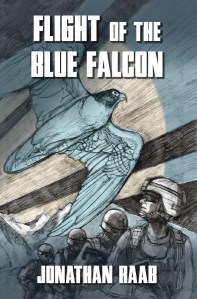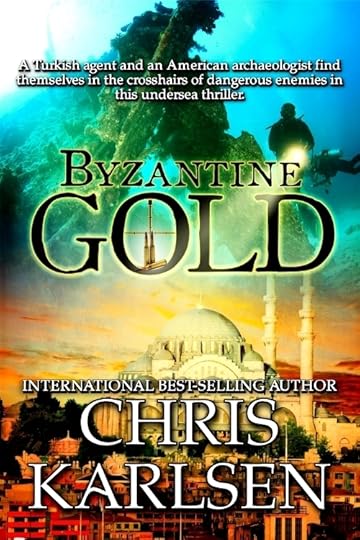Mayra Calvani's Blog - Posts Tagged "action-adventure"
Chris Karslen Talks about her Romantic Thriller, BYZANTINE GOLD
 Though her desire to write began in her teens, Chris spent twenty-five years in law enforcement with two different agencies before she decided to pursue her dreams. Chris is the author of the romantic thrillers Golden Chariot, Byzantine Gold and numerous other romance novels.
Though her desire to write began in her teens, Chris spent twenty-five years in law enforcement with two different agencies before she decided to pursue her dreams. Chris is the author of the romantic thrillers Golden Chariot, Byzantine Gold and numerous other romance novels.Now a fulltime writer, she lives in the Pacific Northwest with her husband, four rescue dogs and a rescue horse.
Learn more about Chris and her work on her website and blog.
Read my review of Byzantine Gold here.
Her mission as an author...
I want to entertain the reader with my stories. I want to share my love of certain things, like places, history, and time travel. It’s my way of saying, this is why I love England or Turkey or history etc. I like using the characters to present a “what if” question and have the reader join me in asking it to.
Her inspiration for Byzantine Gold...
Charlotte and Atakan from Golden Chariot—I like them and wanted to show how their relationship progressed. I also liked many of the support characters. I wanted to bring them back. The best way is another shipwreck. I liked using Turkey, as I did in Golden Chariot but also liked the idea of keeping the setting in that region but not necessarily Turkish waters, but someplace a bit different. I needed it to be a place that Atakan still had authority. I set it in the Turkish Republic of Northern Cyprus. The setting is beautiful and it still, for Americans, has an unusual flavour.
The next thing was what to do with Atakan and Charlotte. I had to resolve the issue of Tischenko and I welcomed the idea of fleshing him out more. I knew I’d set him on a path of revenge but I needed something more for the plot. Terrorism is a global problem. Artifact smuggling is one source of funding for terrorist organizations. I did not want to do the usual Al-Qaeda situation. I chose a terrorist organization that originated in Turkey and is in Iraq and Iran now too, the PKK. The extreme militant wing of the PKK presents an on-going problem in Turkey.
I picked a Byzantine ship because I love some of the art and jewellery from the period.
Her hero and heroine...
Atakan Vadim is an agent for the Turkish Ministry of Culture and Tourism. He has his PHD in archaeology. Fact: The Turkish Ministry of Culture and Tourism has a representative present at all legitimate archaeological sites in the country. Their job is to oversee the safe handling of recovered artifacts along with site safety and preservation.
He is from a middle class family and grew up near the town of Milas in the Mugla Province. His father was a career military man and his mother oversaw the family orchards in his father’s absence. Atakan has a married sister. He’s close to his family but can’t see them often due to distance. Istanbul is over 400 kilometres from Milas.
Atakan is a consummate professional. He is a reserved man unless he knows you well, then he shows his dry sense of humour and with Charlotte his very sensual side. He has a strong sense of honour and ethical code. He’s not a man driven to “obtain or possess” things. His apartment is functional although he has an interesting display of collectibles which are family heirlooms. His apartment has a beautiful view of the Bosphorus Strait and that is more important to him than high end furniture. Nice suits are his one very expensive taste. He likes to dress well on the job.
Charlotte Dashiell is an American nautical archaeologist who just received her PHD. She’s outspoken and extremely determined in her pursuits, which sometimes disturbs, sometimes worries and sometimes amuses Atakan.
She’s the daughter of a Chicago policeman and a homemaker. Her parents divorced when she was a teen and her father remarried to a Chicago policewoman and her mother is remarried to a wealthy businessman. Charlotte also has an older brother who’s a member of the Chicago Police Department SWAT team She too is close to her family and tries to visit once a year.
Like Atakan, she is the consummate professional when working a shipwreck recovery team. She’s not overtly vain as her job requires her to keep her hair simple, she’s diving most days and not concerned with makeup. Conservation work on the relics is hard on a manicure. That said, she has a jealous streak when it comes to Atakan. She’s not above passing an acerbic comment or two when she’s introduced to a former girlfriend of his. When she has the opportunity, she does take pride in her appearance and dresses nicely.
Her guilty pleasure is belly dancing for Atakan. She takes lessons in Istanbul, where they live. Atakan is a big fan.
The overall concept was mine. Although most of the story takes place in Cyprus, Istanbul has such distinctive architecture and buildings I wanted something of it on the cover so a reader knows the story has a different setting. I wanted the shipwreck and divers because of the nature of the story. This is what draws the characters to this place. I worked closely with the designer. I asked her to look at my previous cover, and the trailer for Byzantine Gold, which I was very happy with, and to look at my book boards for both this and Golden Chariot on my Pinterest page. She had the idea for the bullets and crosshairs in the lettering. She put all my wishes together and came up with a cover I love.
Her advice to aspiring authors...
Do join a critique group. You need other eyes to read your work. Your family and friends will avoid hurting your feelings and as a result are often not as honest as you need them to be.
Take classes or if you can afford it, go to conferences and seminars to learn the craft. If you can’t afford workshops, then buy books from the experts. Three I like and keep in my desk and reference are: Writing the Breakout Novel and The Fire in Fiction by Don Maass, and Goal, Motivation, and Conflict by Deb Dixon.
Develop a tough skin and accept the fact that your early drafts (and that’s what they are, drafts) are not ready to send to an editor or agent or to self-publish. Every new writer believes what they’ve written is perfect. Perhaps there’s someone out there this is true for but I can’t think of any. Hemingway said, “There’s no such thing as writing, only rewriting.” Stephen King in his book, “On Writing,” said, he never lets anyone see his first draft.
Read books in the genre you want to write in. This is important. You need to have an idea of how stories in that genre flow, how tension and action and characterization is handled. Literary fiction is generally not the same style as a thriller. The readership of different genres have different expectations.
When you read a scene that is especially moving or well done, or one that stands out to you, then dissect it. See what it is that “makes” the scene work so well for you and try to do the same but with your own spin.
___________________________________________
Book Description
A sunken warship from the Byzantine Era carrying an unusual cargo of gold has been found off the coast of Northern Cyprus. News of the valuable cache has attracted the attention of a terrorist cell. They plan to attack the recovery team’s campsite and steal the artifacts. On the Black Market, the sale of the relics will buy them additional weapons.
Charlotte Dashiell, an American archaeologist, and her lover, Atakan Vadim, a Turkish government agent, are scheduled to be part of the recovery team that brings up the artifacts. While en route to Cyprus, they find themselves caught in the crosshairs of Maksym Tischenko, a Ukrainian contract killer bent on revenge. Charlotte, Atakan and Tischenko share a grim history. As a result, Tischenko is a man who will stop at nothing to achieve his goal—seeing them both dead.
Read the first chapter / Purchase from Amazon


A Chat with Jonathan Raab, Author of ‘Flight of the Blue Falcon’

 Jonathan Raab is a veteran of the Afghanistan war, where he served as an infantryman assigned to a combat advisor team. He is the editor-in-chief of Muzzleland Press and an editor for the War Writers’ Campaign. His work has appeared in The New York Times’ At War Blog, CNN.com, the Military Success Network, Literati Presents, The Stars and Stripes, and many others. His second novel, The Hillbilly Moonshine Massacre, will be available in late 2015. He lives in the Denver metro area with his wife Jess and their dog, Egon.
Jonathan Raab is a veteran of the Afghanistan war, where he served as an infantryman assigned to a combat advisor team. He is the editor-in-chief of Muzzleland Press and an editor for the War Writers’ Campaign. His work has appeared in The New York Times’ At War Blog, CNN.com, the Military Success Network, Literati Presents, The Stars and Stripes, and many others. His second novel, The Hillbilly Moonshine Massacre, will be available in late 2015. He lives in the Denver metro area with his wife Jess and their dog, Egon.Connect with Jonathan Raab on the Web:
Website / Facebook /Twitter
Q: Congratulations on the release of your book, Flight of the Blue Falcon. To begin with, can you gives us a brief summary of what the story is about and what compelled you to write it?
The novel is about three men who serve in an infantry platoon deployed to the Afghanistan War. It follows their training, their deployment, and a little bit of them coming home from it all. I wanted to tell the story of men serving in the Long War, especially from the National Guard perspective.
Q: What do you think makes a good military novel? Could you narrow it down to the three most important elements? Is it even possible to narrow it down?
War writing tends to be nonfiction, but I think fiction is the best place to tell war stories. You can tell more truth that way. Every war is different; every war is the same. But every good war story should have good characters, be accessible to civilians, and tell something new (if possible) or true (as true as a story about war can be).
Q: How did you go about plotting your story? Or did you discover it as you worked on the book?
I tend to outline everything from the start, but that outline changes as I write. It’s a constant process of writing to catch up with the outline, and discovering that the plot is moving in new and unexpected directions.
Q: Tell us something interesting about your protagonist and how you developed him or her. Did you do any character interviews or sketches prior to the actual writing?
I have three protagonists in the novel, which is something I wouldn’t recommend to aspiring writers! Each character offered a unique perspective on the book’s events. They’re all based on guys I know, in whole or in part. A little bit of me is in each of them, too.
Q: In the same light, how did you create your antagonist or villain? What steps did you take to make him or her realistic?
There’s no real antagonist. The Taliban is in this book, of course, but they’re not really the focus. This is more of a character study—how three men deal with going through the Big Green Army Machine.
 Q: How did you keep your narrative exciting throughout the novel? Could you offer some practical, specific tips?
Q: How did you keep your narrative exciting throughout the novel? Could you offer some practical, specific tips?I tend to write short, focused chapters. That helps the reader feel accomplished as they go—hey, I finished another chapter!—and so they keep reading. Each scene should communicate something new and important about your characters, the plot, or (preferably) both. If your scene doesn’t do that, cut it. Cut it right out.
Q: Setting is also quite important and in many cases it becomes like a character itself. What tools of the trade did you use in your writing to bring the setting to life?
There’s several settings here—but the prevailing setting is that of the Army culture itself. The use of specific language, cultural tropes, and illustrative anecdotes or scenes helps to communicate that to an audience that may not have served in the military. Try to tell larger truths about the setting or culture in small, focused ways. For example, there’s a scene where our characters arrive in Afghanistan on a big command base. Instead of being greeted by enemy fire and soldiers around them ready for combat, they’re screamed at for minor uniform infractions. That scene tells a lot about the culture and the situation, and what’s to come for our characters.
Q: Did you know the theme(s) of your novel from the start or is this something you discovered after completing the first draft? Is this theme(s) recurrent in your other work?
The broader theme is that war is stupid—on several levels. I knew that going in, and my characters and plot didn’t disappoint in that regard.
Q: Where does craft end and art begin? Do you think editing can destroy the initial creative thrust of an author?
Editing should refine the creative thrust. If it compromises it, it’s not really editing, it’s revision. That said, authors need to know when to throw out those lines or scenes they really love—we can convince ourselves something is really good when it is in fact unnecessary or even distracting.
Q: What three things, in your opinion, make a successful novelist?
1) The novelist finishes a novel. 2) The novelist is open to intense but fair criticism to make the book better. 3) The novelist keeps writing, and keeps improving.
Q: A famous writer once wrote that being an author is like having to do homework for the rest of your life. What do you think about that?
It’s like homework, sure, but it’s also a lot of fun. It’s also very frustrating. It’s a love-hate activity, for sure.
Q: Are there any resources, books, workshops or sites about craft that you’ve found helpful during your writing career?
This is a cliché, but Stephen King’s On Writing is really, really good. I’ve taught a part of it in my English class. I’ve never been to a workshop, so I can’t speak to that. I will say that you don’t need a fancy MFA or creative writing degree to be a writer, although those things can certainly be helpful to many people.
There’s a whole industry designed to separate writers from their money, so don’t go chasing expensive conferences, retreats, or seminars. They might be helpful, but you can probably learn more from joining a free writers’ group or just plugging away at the craft. Books are cheap, so read all the time. And it doesn’t cost you anything to write and share your work with trusted friends who will give you open and honest feedback.
You just have to be ready to be told that your precious baby of a story sucks, because you will write something that is awful. And that’s okay. What matters is how you deal with your failures—large and small. Don’t quit. Keeping writing. Even if it takes you the rest of your life to get published.
Q: Is there anything else you’d like to share with my readers about the craft of writing?
Don’t let your own ego get in the way of producing better work. Also, don’t worry about being a perfectionist—write, write, and write until that project of yours is finished. You can fix all of your issues in editing, when you open the door to others, and when you can read your own work with fresh eyes.




